

Sex and the College Girl - Nora Johnson. A native of California and a graduate of Smith College in the class of 1954, Nora Johnson has traveled widely, first through Europe, and after her marriage, through the Middle East.
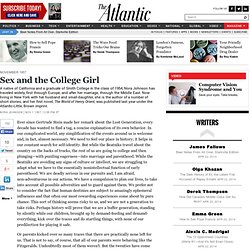
Now living in New York with her husband and small daughter, she is the author of a number of short stories, and her first novel, The World of Henry Orient, was published last year under the Atlantic-Little, Brown imprint. Ever since Gertrude Stein made her remark about the Lost Generation, every decade has wanted to find a tag, a concise explanation of its own behavior. In our complicated world, any simplification of the events around us is welcome and, in fact, almost necessary. We need to feel our place in history; it helps in our constant search for self-identity. But while the Beatniks travel about the country on the backs of trucks, the rest of us are going to college and then plunging—with puzzling eagerness—into marriage and parenthood.
All the Single Ladies - Kate Bolick. In 2001, when I was 28, I broke up with my boyfriend.
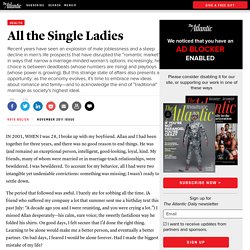
Allan and I had been together for three years, and there was no good reason to end things. He was (and remains) an exceptional person, intelligent, good-looking, loyal, kind. I hate Strong Female Characters. I hate Strong Female Characters.
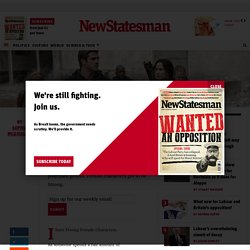
As someone spends a fair amount of time complaining on the internet that there aren’t enough female heroes out there, this may seem a strange and out of character thing to say. And of course, I love all sorts of female characters who exhibit great resilience and courage. I love it when Angel asks Buffy what’s left when he takes away her weapons and her friends and she grabs his sword between her palms and says “Me”. In Crouching Tiger, Hidden Dragon, I love Zhang Ziyi’s Jen sneering “He is my defeated foe” when asked if she’s related to Chow Yun-Fat's Li Mu Bai. I love Jane Eyre declaring “I care for myself” despite the world’s protracted assault on her self-esteem. Guante: 10 Responses to the Phrase "Man Up" (Spoken-Word)
I hate Strong Female Characters. I was a Manic Pixie Dream Girl. Like scabies and syphilis, Manic Pixie Dream Girls were with us long before they were accurately named.
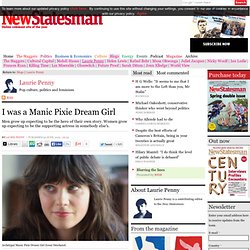
It was the critic Nathan Rabin who coined the term in a review of the film Elizabethtown, explaining that the character of the Manic Pixie Dream Girl "exists solely in the fevered imaginations of sensitive writer-directors to teach broodingly soulful young men to embrace life and its infinite mysteries and adventures". She pops up everywhere these days, in films and comics and novels and television, fascinating lonely geek dudes with her magical joie-de-vivre and boring the hell out of anybody who likes their women to exist in all four dimensions.
When Men Experience Sexism - Noah Berlatsky. Can men be victims of sexism?
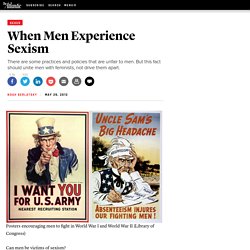
An NPR Morning Edition report this week suggests strongly that the answer is "yes. " As Jennifer Ludden reports, after divorce men can face burdensome alimony payments even in situations where their ex-wives are capable of working and earning a substantial income. Even in cases where temporary alimony makes sense—as when a spouse has quit a job to raise the children—it's hard to understand the need for lifetime alimony payments, given women's current levels of workforce participation. The READ: You Wouldn’t Like Her Angry. But the other reason the audience responded so favorably to Amelia Gray, I think, had to do with the contrast between her appearance and her words.

This is what many successful female comedians, from Joan Rivers to Sarah Silverman, have always known: if your lines are threatening, your face had better not be. A Piece of Work, the new documentary about Rivers in which she manages, extraordinarily, to come across as a largely sympathetic figure, demonstrates that, as her looks have altered with age, her brand of comedy has become far less cruel. In her early appearances with Johnny Carson, 40 years ago, she looked like a fifties housewife, her hair gelled into a bouffant or piled in curls atop her head, her gestures as elastic as her facial expressions.
But when she opened her mouth, her girlish voice delivered the most incendiary insults. Feminism is the one F-word that makes eyes widen in polite company. What is it about the word “feminism” that frightens people so much?
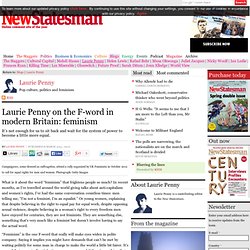
In recent months, as I’ve travelled around the world giving talks about anti-capitalism and women’s rights, I’ve had the same conversation countless times: men telling me, “I’m not a feminist, I’m an equalist.” Or young women, explaining that despite believing in the right to equal pay for equal work, despite opposing sexual violence, despite believing in a woman’s right to every freedom men have enjoyed for centuries, they are not feminists. They are something else, something that’s very much like a feminist but doesn’t involve having to say the actual word. “Feminism” is the one F-word that really will make eyes widen in polite company.
Saying it implies you might have demands that can’t be met by waiting politely for some man in charge to make the world a little bit fairer. WHY GIRLS IS REMARKABLE. [REGARDING FILM CRAFT] No.
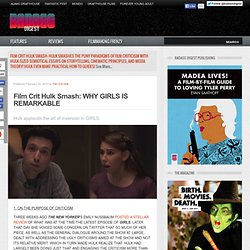
I think her reading of that stuff was pretty superficial as well. She had a great gift for setting movies in cultural context, but what set her apart from most critics—and especially a lot of critics today—was that she was at her absolute best when she loved something. And that was exciting to read. Hulk Vs. The GIRLS Criticism. BEAKS DESCRIBES THE FILM SIMPLY: "[I AM LOVE] is anathema in this age of pure calculation; it's about getting drunk on the potential of the medium.

" ANONYMOUS COMMENTER: You know, equality of the sexes means that women are able to be criticized just like men. It doesn't mean that we have to treat every woman like she's in the special olympics and claim everything they do is amazing. If a man made this show you wouldn't be praising it so much. How "sex tips for girls" are ruining sex. Have you ever seen anyone having sex?
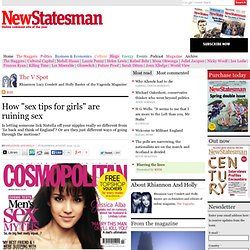
And we mean actual sex, where at least one of the participants has cellulite, and oral more often produces jaw ache than cataclysmic mutual orgasms. One of us once caught a neighbour in the act. The Season Two Premiere of Girls: Lena vs. Hannah. Many people wondered why there were no non-white characters of any prominence in the first season of “Girls.” Now, at the very start of the second season, Hannah’s new lover (played by Donald Glover), for whom she’s maybe about to ditch her first-season boyfriend, Adam, is a young black man. In their first scene together, they reminisce about how they met—he was a customer at the coffee shop where she works as a barista. The convenient way of filling in the backstory (and the gap of time between now and the end of the last season) is beside the point; what’s important is the emphasis the anecdote places on Hannah’s day job. That Sex Scene on Last Night's "Girls"
Last week, I wrote a column about Lena Dunham’s HBO show “Girls.” I had a bunch of abstract, cranky, intellectual goals: I wanted to pluck “Girls” out of the debate about Millennials, for starters. I wanted to analyze its critical reception. I wanted to put the discussion of “privilege” in a different light. And I wanted to talk about “Girls” specifically as television. Emily Nussbaum: “Girls,” “Enlightened,” and the Comedy of Cruelty. The HBO series “Girls” has been a trending topic all year, but in one sense it’s nothing new.
Created, written, and directed by the twenty-six-year-old Lena Dunham, who plays the wannabe memoirist Hannah Horvath, “Girls” is merely the latest in a set of culture-rattling narratives about young women, each of which has inspired enough bile to overwhelm any liver. Among the most famous is Mary McCarthy’s novel “The Group,” from 1963, with its scene of a humiliated girl sitting in Washington Square Park with her contraceptive “pessary.” Women clung to that book like a life raft, but “The Group” was sniffed at by Norman Podhoretz as “a trivial lady writer’s novel,” while Norman Mailer called its author “a duncey broad” who was “in danger of ending up absurd, an old-maid collector of Manx cats.” Shape shifter: The joyous transgressions of Virginia Woolf’s Orlando. Yesterday morning I was in despair...
I couldn’t screw a word from me; and at last dropped my head in my hands: dipped my pen in the ink, and wrote these words, as if automatically, on a clean sheet: Orlando: a Biography . . . [I]t sprung upon me how I could revolutionise biography in a night... Virginia Woolf to Vita Sackville-West, 9 October 1927 It was playful and bold to write a novel as though it were a biography, and to call a fiction a life, and to invent that life around a woman the author was in love with, and to stretch her over 400 years, like a body freed from the problems of gravity. In Orlando (1928), Virginia Woolf did away with the usual co-ordinates of biography and set off through time as though it were an element, not a dimension. Boys. Thierry Caro In the first three paragraphs of Thomas B. Morgan’s 1960 Look profile of Brigitte Bardot, the writer refers to the actor’s “magpie hairdo,” her “girl-woman earthiness,” her rich father, her promiscuity (his inference, not hers), and her refusal to embrace a traditional motherhood role.
He calls her “the sassy kitten,” puts her in a category alongside French wine and small cars, and resents her for being so wildly popular. One rather important detail is missing from this heap of vitriol: her name. Why Gender Equality Stalled. The problem with Manic Pixie dream girls. The Sunday Rumpus Interview: Margaret Atwood. The Loves of Lena Dunham by Elaine Blair.